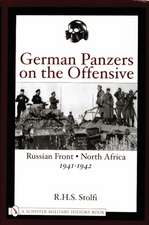Public Opinion and the End of Appeasement in Britain and France
Autor Daniel Huckeren Limba Engleză Paperback – 14 oct 2024
| Toate formatele și edițiile | Preț | Express |
|---|---|---|
| Paperback (1) | 262.14 lei 6-8 săpt. | |
| Taylor & Francis – 14 oct 2024 | 262.14 lei 6-8 săpt. | |
| Hardback (1) | 1054.71 lei 6-8 săpt. | |
| Taylor & Francis – 28 ian 2011 | 1054.71 lei 6-8 săpt. |
Preț: 262.14 lei
Preț vechi: 312.54 lei
-16% Nou
Puncte Express: 393
Preț estimativ în valută:
50.16€ • 52.44$ • 42.39£
50.16€ • 52.44$ • 42.39£
Carte tipărită la comandă
Livrare economică 06-20 martie
Preluare comenzi: 021 569.72.76
Specificații
ISBN-13: 9781032922850
ISBN-10: 1032922850
Pagini: 304
Dimensiuni: 156 x 234 mm
Greutate: 0.56 kg
Ediția:1
Editura: Taylor & Francis
Colecția Routledge
Locul publicării:Oxford, United Kingdom
ISBN-10: 1032922850
Pagini: 304
Dimensiuni: 156 x 234 mm
Greutate: 0.56 kg
Ediția:1
Editura: Taylor & Francis
Colecția Routledge
Locul publicării:Oxford, United Kingdom
Public țintă
AcademicNotă biografică
Dr Daniel Hucker, Teaching Associate, School of History, University of Nottingham, UK
Cuprins
Introduction; Chapter 1 The Prelude to Munich; Chapter 2 The Aftermath of Munich, October–December 1938; Chapter 3 Beware the Ides of March, January–March 1939; Chapter 4 Repercussions of the Prague Coup; Chapter 5 Appeasement after Prague; Chapter 6 Public Opinion and the Triple Alliance Negotiations; Chapter 7 From the Nazi-Soviet Pact to War; Chapter 101 Conclusion;
Recenzii
'This is a richly researched and closely argued book in which issues, personality clashes, party factionalisms, and the evolution of opinion towards firm acceptance of the need to fight Nazism in 1939 are nicely finessed and treated with genuine sensitivity. Daniel Hucker avoids snap judgements, preferring instead to analyse and explain why and how French and British political leaders acted and reacted as they did when confronted with the increasingly desperate circumstances before them. It is an outstanding piece of work and is sure to make an impact.' Martin Thomas, University of Exeter, UK ’Daniel Hucker’s first book is a model of sustained, meticulous research... It is innovative in its recognition of possible connections between the mood of one country and the policy of another; and it is a welcome addition to a corpus of literature that transcends the once-dominant notions of French lethargy and submissiveness.’ English Historical Review 'Hucker has done the scholarly community a service by analysing French and British policymaking in such careful detail and in tandem.' French History 'Daniel Hucker’s monograph is a valuable addition to current literature. Meticulously researched, this work does far more than survey public opinion... [It] has an excellent bibliography and is rich in archival sources, both British and French. It is well written with strong, fluent analysis throughout... his work reveals the links between the unspoken assumptions shaping foreign policy and the diplomatic process itself. Hucker is thus able to illuminate the organic, multi-faceted nature of foreign policy and policy-making in the crucial months prior to the outbreak of World War II.' European History Quarterly 'The scope and depth of Hucker’s research ensures he avoids the easy trap of merely recreating those conclusions on public opinion that contemporary figures cared to record. His study is based upon a meticulous survey of available sources in both Britain and
Descriere
The 1930s policy of appeasement is still fiercely debated more than 70 years after the signing of the 1938 Munich Agreement. Less examined is the role of public opinion on the formation of British and French policy in the period between Munich and World War II. Public Opinion and the End of Appeasement in Britain and France is essential reading for














